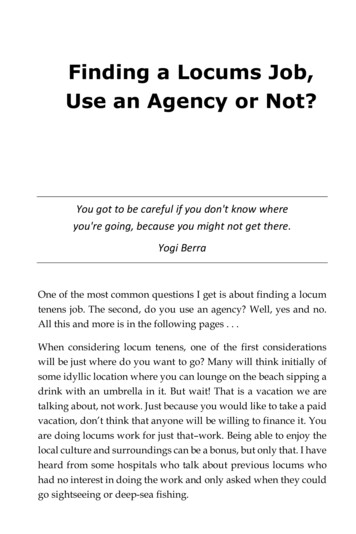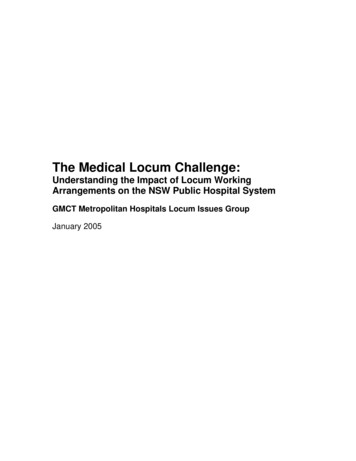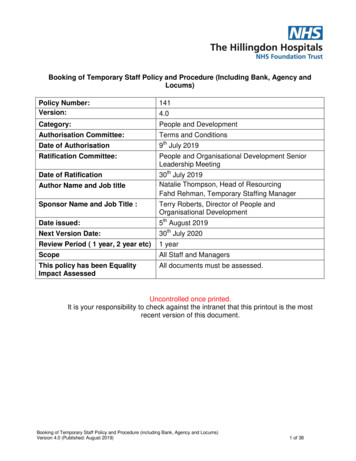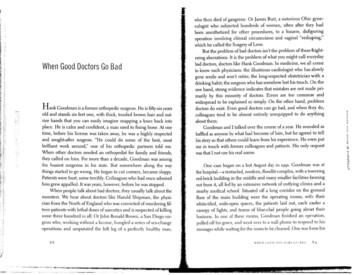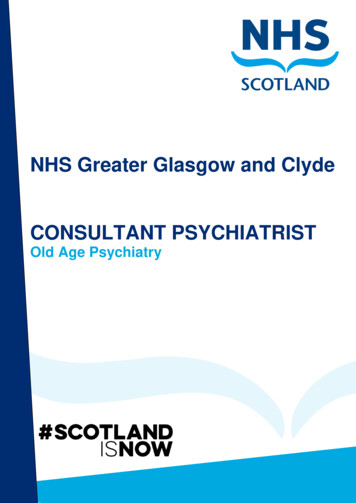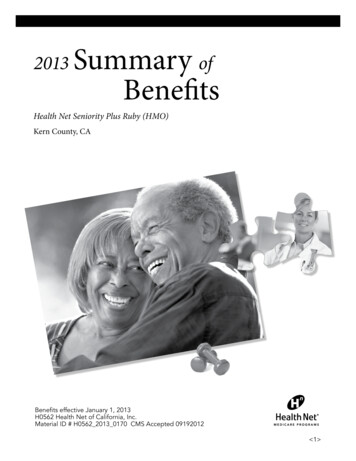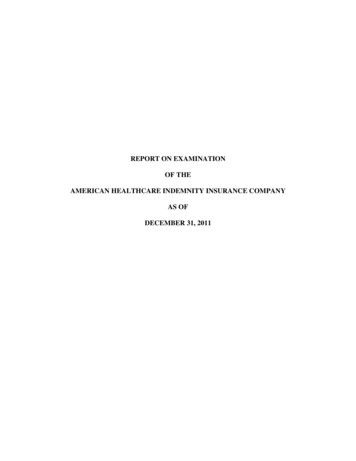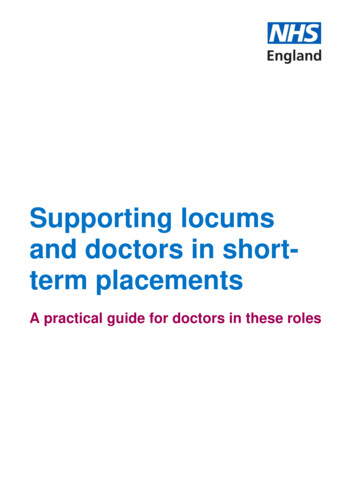
Transcription
Supporting locumsand doctors in shortterm placementsA practical guide for doctors in these roles
2
Supporting locums and doctors in short-term placements:A practical guide for doctors in these rolesVersion number: 1.0First published: October 2018Prepared by: Ruth Chapman, Associate Medical Director (Revalidation) and RegionalAppraisal Lead, NHS England London Regional Team Mark Cohen, Professional Standards Team, Medical Directorate (central),NHS EnglandClassification: OFFICIALPromoting equality and addressing health inequalities are at the heart of NHSEngland’s values. Throughout the development of the policies and processes cited inthis document, we have:Given due regard to the need to eliminate discrimination, harassment and victimisation, toadvance equality of opportunity, and to foster good relations between people who share arelevant protected characteristic (as cited under the Equality Act 2010) and those who do notshare it; andGiven regard to the need to reduce inequalities between patients in access to, and outcomesfrom healthcare services and to ensure services are provided in an integrated way where thismight reduce health inequalities.3
Contents1.Purpose of this guidance . 52.Roles, connections, professional responsibilities and the nature of theorganisation. 93.Pre-employment checks . 124.Induction . 145.Appraisal, continuing professional development and supporting information . 166.Clinical Governance and performance concerns. 217.Conclusion . 238.Appendices: . 24- Appendix A – e-Medical Practice Information Transfer (e-MPIT) form . 24- Appendix B – Useful resources . 26- Appendix C – References . 28- Appendix D – Contributors . 304
1. Purpose of this guidanceThis guidance is directed towards all doctors (primary and secondary care) wholocum or work within health organisations for short-term placements. If you are adoctor working in this way there are specific challenges for you. You often do nothave easy access to systems or structures in place to support your continuingprofessional development, appraisal, revalidation, and governance. It is hoped thatthis guidance, along with the accompanying guidance ‘Supporting organisationsengaging with locums and doctors in short-term placements: A practical guide forhealthcare providers, locum agencies and revalidation management services’ (NHSEngland 2018), will highlight ways that you may be supported to provide safeprovision of healthcare as a valuable part of the workforce.For the purposes of this guidance, a locum refers to a doctor who is either placed bya locum agency/GP chambers, or a locum bank to work in a healthcare providerorganisation or directly engages with health care organisations or GP practices forshort-term work, and a doctor in a short-term placement is one who is an employeeof the organisation for a short, fixed term.There may also be doctors in training who work as locums outside their trainingprogramme and who are therefore connected to Health Education England (HEE) astheir designated body.At the end of this document there are useful resources and references for you to useas appropriate.Organisations, including healthcare providers, GP practices and locum agencies,may tailor this guidance for their own corporate requirements to assist their ownlocum and short-term placement doctors, or use it as it is. This guidance aims topromote a standardised approach to working with locum and short-term placementdoctors across primary and secondary care and in all sectors. It is hoped that it willact as a benchmark as models of care and systems develop over time.How should you be supported in your role? You should be provided with induction (including access to local and orpractice guidance and clinical pathways) and access to buildings andappropriate IT systems You should only be placed in roles where you are able to work withinyour limitations You should be given feedback on your practice and encouraged toattend multidisciplinary meetings and CPD to support you in yourlearning and development and to make collecting supporting informationfor your appraisal simpler You should be supported in engaging with appraisal and revalidationsystems You should be informed about and given timely access to informationrelating to serious untoward incidents, significant events andcomplaints. You should be informed about processes of escalation andoffered appropriate support relating to these events5
What are your overall responsibilities? To comply with all GMC requirements To comply with pre-employment and induction processes To accurately represent your skills and competencies and work withinyour limitations To know who your responsible officer is, who you are accountable toand to work within organisational governance To gather supporting information (e.g. from CPD, exit forms and 360feedback) and engage in whole scope of practice annual appraisal,sharing information about your practice with organisations whenappropriateBackgroundLocums and doctors in short-term placements are an essential part of the work force,contributing to patient care and safety.There is no evidence available to suggest that locums or doctors in short-termplacements put patients more at risk compared to other doctors in more substantiveposts. However, there have been a number of significant events relating toindividuals presenting themselves as locums where appropriate pre-employmentchecks were not carried out. These incidents have led to some concern aboutdoctors who work as peripatetic locums, the governance arrangements around themand their connections to designated bodies and responsible officers.There is a risk that, due to the peripatetic nature of this part of the workforce, somelocums and doctors in short-term placements may not be embedded within a strongclinical governance system to support both their clinical practice and continuingprofessional development. This can include issues such as the absence of induction,not knowing how to escalate concerns, and being placed in challenging environmentsor untested models of care.Sir Keith Pearson was commissioned by the General Medical Council (GMC) toproduce an independent report ‘Taking revalidation forward: Improving the process ofrelicensing for doctors’ (GMC January 2017). This highlighted concern about the‘rigor of appraisal and revalidation’ for locums as well as issues around theconnection of doctors taking on short-term placements. Sir Keith’s report alsosuggested the need to reduce the burden and improve the experience of appraisalfor doctors in general. This should involve improved organisational systems anddoctors’ access to them.The Medical Profession (Responsible Officer) Regulations 2010, amended 2013,define the designated body’s and responsible officer’s statutory obligations towardstheir connected doctors – including doctors who are working as locums.Information about the Responsible Officer RegulationsThe Medical Profession (Responsible Officers) Regulations 2010The Medical Profession (Responsible Officers) (Amendment) Regulations 2013NHS Improvement took steps in 2016 to cap secondary care locum costs, byproducing a set of ‘agency rules’ for trusts. One of the rules stated that healthcare6
organisations are required to procure all agency staff from approved frameworkagreements. These frameworks specify how locum agencies should act with respectto pre-employment checks of locums and doctors in short-term placements based onstandards defined by NHS Employers.In October 2016 NHS England convened a group of stakeholders to discuss issuesrelating to this group of doctors. The result of this discussion was the agreement ofthe following set of working principles for doctors, locum agencies, and healthcareproviders. These have been tested and refined through conversations with all threegroups:As a locum, or a doctor working in a short-term placement, you are responsiblefor: Complying with specific GMC requirements for registration and licence topractise including identity, language and other checks for remaining on themedical registerComplying with any GMC warnings, conditions or undertakings. You must notput yourself in a position where you are unable to comply with restrictions onyour practice. You should inform the organisation about any restrictions beforeyou start work so that they can support you to practise within the restrictionsComplying with pre-employment processes including identity, language,Healthcare Professionals Alert Notices (HPANs), health clearance and otherchecks when starting with a new healthcare provider. These checks should becompleted prior to any shifts being commencedParticipating in the induction processes of organisations where you workAccurately representing your skills and competenciesAccruing supporting information about your individual medical practice,including end of placement/exit reports and peer/colleague feedback fromplacementsKnowing who your responsible officer is, who you are accountable to and whoyou should report toProviding relevant information about your professional practice to your locumagency (where relevant) and any organisations where you workParticipating in annual whole scope of practice medical appraisalEngaging in the governance system of the organisations where you work aswell as those of your designated body (including engaging with the responsibleofficers, or clinical governance leads of both)Engaging with revalidation and the processes that support itAdhering to the requirements of Good Medical Practice (GMP) (2013) and theGMC, including the requirement to have adequate and appropriateindemnity/insurance cover for the work that you doEngaging with processes to investigate and address any concern about yourpractice or the systems in which you work7
A locum agency is responsible for:(some of these points are less applicable for GP locums) Appointing a responsible officer (if it is a designated body), or a clinicalgovernance lead and providing them with resources. The locum agency musttell their doctors who the responsible officer is and inform them of any feesrelating to the appraisal and revalidation processUndertaking pre-employment checks including GMC requirements forregistration and licence to practice, identity, language, health clearance andother checks for any doctor joining, such as HPANs. These checks shouldbe completed prior to any shifts being commencedEnsuring it is aware of any doctors who have GMC conditions or undertakingson their registration and that they are only placed in roles where they will beable to work within those restrictionsHaving processes to monitor the doctor’s practice in relation to the work theyare being supplied to do, including end of placement/exit reports andpeer/colleague feedback from the doctor’s placementsSharing information of note relevant to the doctor’s intended work with anyorganisation to which the doctor is being supplied, in advance of aplacement if known, or as it arisesAccurately representing the skills and competencies of a locum doctor to theengaging organisationEnsuring the provision of annual appraisal to the standards of the ‘MedicalAppraisal Guide’ (NHS England 2014) for the doctor, whether through theagency or in an organisation where the doctor is undertaking a placement.NHS England GPs’ appraisals are organised through the NHS England localteamsCoordinating feedback and other information such as end of placement/exitreports and peer/colleague feedback, and sharing it with the doctor forappraisal, professional development, and the maintenance of records of suchprocessesReceiving information about, and responding to, any potential concerns aboutthe doctor’s practice, coordinating any investigative process required as aresult and agreeing where this should be situated, whether in the agency or inone or more of the organisations where the doctor has worked (includingspeaking to the NHS England local team (if appropriate), or the GMCEmployer Liaison Advisor (ELA) for advice on whether any concern meetsGMC thresholds). The doctor should be kept informed of the processProviding a governance framework for doctors, whether or not the doctor’sprescribed connection is to the agency. This includes such things as having aprogramme to support the doctor’s professional development in a mannerappropriate to the nature and duration of the placement and provision ofsupporting information for appraisal, as described in the NHS Englanddocument ‘Improving Inputs to Medical Appraisal’ (NHS England 2016)Having processes for monitoring connections of doctors and ensuring they areup to date8
Having processes for ensuring doctors’ appraisals take place annually andthat appraisal systems are quality assuredA healthcare provider which engages the locum doctor is responsible for (at thepoint of placement): Verifying that GMC registration and licence to practise, HPAN, identity,language, health clearance and other checks have taken place, or undertakingthese if this cannot be verified Ensuring that it is aware if any doctors placed with them who have GMCconditions or undertakings on their registration and that they will be able towork within these restrictions Accurately representing to the locum doctor and locum agency (whererelevant) which skills and competencies are required in the position for whichthe doctor is being engaged Providing suitable induction to the doctor to enable them to carry out the workthey are being engaged to do (including appropriate IT system login/access,buildings/departmental access and the process for escalating concerns) Completing the required end of placement/exit report and peer/colleaguefeedback for the doctor Integrating the doctor into their governance structure in a manner appropriateto the nature and duration of the placement Supporting the doctor’s appraisal preparation Agreeing with the doctor and at the discretion of the doctor’s responsibleofficer, to provide annual appraisal for the doctor, if appropriate to do so (inlight of the nature and duration of the doctor’s placement), to the standard ofthe ‘Medical Appraisal Guide’ (NHS England 2014); along with 'Guidance onsupporting information for appraisal and revalidation' (GMC 2018). NHSEngland GPs’ appraisals are organised through the NHS England local teams Notifying the doctor and locum agency (where relevant) if any significantinformation of note arises in relation to the doctor’s practice during theirplacement (and/or the doctor’s responsible officer if the agency is not thedoctor’s designated body) Agreeing with the locum agency or NHS England local team (where relevant)whether any necessary investigation is carried out in the organisation Including quality elements within the service level agreement (if applicable)with the locum agency to facilitate the above2. Roles, connections, professional responsibilities and thenature of the organisationEvery doctor has a professional duty to maintain fitness to practise. This includesworking within your skills and competence, keeping up to date and engaging with theappraisal and revalidation process. It is also important that you adhere to any steps9
taken to manage performance concerns that may have been raised about yourpractice or to address risks to patient care related to your health.The governance network around a doctor can vary in scale and complexity,depending on the number of places where you work and the nature of theseorganisations.Doctors only have one designated body and one responsible officer.Secondary care and private sector locumsIf you are a locum or short-term placement doctor working in secondary care, yourdesignated body will usually be one of the following, as defined by the ResponsibleOfficer Regulations: A locum agency which places you within a provider setting (NHS or private) tocarry out your clinical duties. You connect to the locum agency that places youin work the most over the last twelve months, even if you are registered with orhave worked for more than one locum agency over that yearA NHS England local team - a small number of locum or short-term placementdoctors who are not GPs may connect to one of these local teams (forexample, you may work through a locum agency which is not a designatedbody)A NHS trust, where the doctor carries out most of their clinical practice, eventhough they may also do some locum work in addition to this. (There are alsoan increasing number of regionally based locum provider banks within oracross trusts placing locums, although working in this way does notnecessarily lead to a connection to a trust)Health Education England, if you are currently on a training programmeThe relationships a secondary care locum doctor may have with organisationsLocum Agency(that places you in most jobs)Your‘Connection’Your ‘Designated Body’OtherlocumagencyResponsible OfficerYearlyAppraisalsYou,the locumRecommendsyou everyfive yearsGMCrevalidates you every five yearsand you retain your licenceOtherlocumagencyTrust ATrust BGeneral PractitionersIf you are a NHS GP locum, you are required to be on the National Performers Listand therefore your prescribed connection is to NHS England (as your designatedbody). Your responsible officer is the responsible officer of the NHS England localteam in the area where you carry out most of your clinical work, or if your work isspread equally across a number of local team areas, your responsible officer is the10
one for the local team nearest your home address, as registered with the GMC. ManyGP locums work freelance engaging with GP practices directly for employment,others sign up to an agency to arrange placements and some work within GPchambers and may use online platforms. GPs working solely in the private/non-NHSsector will connect to a private sector designated body/locum agency.Approved practice settingsIf you are new to the register, or are returning after a significant break (for example,from working in some other parts of the world), you may have an Approved PracticeSetting (APS) requirement on your registration. You will need to connect to adesignated body with a responsible officer. You cannot work independently andfreelance as a locum. You can find more information about APS on the GMCwebsite.How to find your designated bodyThe GMC online connections tool will help you find your designated body.Responsible Officer and those with governance responsibility for your practiceA designated body is required to nominate or appoint a responsible officer accordingto the rules set out in the Responsible Officer Regulations. Responsible officers havestatutory duties in relation to doctors with whom the designated body has aprescribed connection. These include: Ensuring that proper identity and other pre-employment checks are in placeEnsuring regular appraisals of connected doctorsManaging concerns about a doctor’s fitness to practiseMonitoring conditions or undertakings imposed or agreed with the GMCMaking a recommendation to the GMC about the doctor’s revalidation,normally every five yearsOften the responsible officer is also the medical director of the organisation.Designated bodies are required to have good governance systems which support theresponsible officer in the discharge of their statutory role.The term ‘person with governance responsibility for the doctor’s practice in a placewhere the doctor is working’ in this paper refers to a person in a setting other thanthe doctor’s designated body.For example, if a secondary care doctor works only as a locum connected to locumagency A (and has performed most of their work in the previous calendar yearthrough locum agency A), their prescribed connection will be to locum agency A andthe responsible officer of locum agency A will be their responsible officer. If thatdoctor is placed and undertakes sessions in an NHS trust, the trust medical director(who may also be the responsible officer for the trust) is the ‘person with governanceresponsibility for the doctor’s practice’ in the trust. An individual doctor may relate toa number of such persons depending on their scope of practice.If you are a GP locum working in a number of practices or for a GP chambers, theperson with governance responsibility for your practice where you work as a locum islikely to be a partner/clinical lead in each setting during each placement. Therefore,a partner/clinical lead in every GP setting should be specifically nominated tooversee clinical governance for you and monitor your practice, for example,reviewing significant events and complaints. It is good practice for GP practices11
to include locums and doctors in short-term placements in any governance andeducational meetings that the practice has. Any concerns relating to you or yourpractice should be raised with you in the first instance. Significant concerns orinformation of note should be escalated by the practice or GP chambers to yourresponsible officer (whose team manage those on the National Performers List) orthe GMC as appropriate.A person with governance responsibility for your practice has a duty to cooperatewith your responsible officer in addressing a concern about your practice. Theinformation flows which support this, along with how information about you as adoctor should be appropriately shared, when and by whom, are described in theguidance ‘Information flows to support medical governance and responsible officerstatutory function’ (NHS England 2016).Information on designated bodies, the responsible officer and clinicalgovernance rolesMore information can be found on the GMC and NHS England websites.Joining a new locum agencyWhen you register with a new locum agency, that agency must establish whetheryour prescribed connection is transferring to them.If it is, then the previous responsible officer must pass information about yourpractice, including appraisal outputs and any information of note, to your newresponsible officer in the new agency. The new responsible officer can also requestthis information from the previous responsible officer and yourself.If it is not, then the new agency should notify your responsible officer to inform themthat you have joined their service. This is so that your responsible officer is keptinformed of your full scope of practice, and is also able to share any information ofnote that might exist in relation to your practice with your new agency.3. Pre-employment checksWhen you are recruited as a locum or a doctor in a short-term placement, a numberof pre-employment checks are made to verify your identity and that you are compliantwith all the competency requirements of your given role. Locum agencies areexpected to conform to NHS Employers employment check standards.The usual checks that should be made are: Identity and right to work check and visa status if relevant, for example, thevisa sponsor and how many hours a locum can work under the terms of thevisaGMC registration and licence check including whether the doctor has any livewarnings, conditions or undertakingsNational Performers List information (if relevant)Any additional restrictions on practice and identification of adequate support ifrelevantHPAN noticesDisclosure and Barring Service (DBS) checks - always enhanced checks12
Specialty qualifications or evidence that you have the appropriate skills andcompetencies for the placementOccupational Health checks relevant to the given role (for example,bloodborne virus health clearance including hepatitis B vaccination/immunity)Mandatory and statutory training in line with role (for example, safeguardingand cardiopulmonary resuscitation (CPR))Language checksIndemnity or insurance checksAs a GP locum you may engage directly with GP practices providing yourcredentials to the practice manager yourself. This may also now be done by sharinglinks to online platforms. The CQC provides GP practices with guidance aboutensuring the suitability of GP locums including those employed through locumagencies.You have a responsibility under ‘GMP’ (GMC 2013), to declare any restrictionspreviously placed on your practice to locum agencies and any organisations whereyou carry out medical work, including where you see patients independently. Youshould make these declarations before you start working in any new placement.The pre-employment checks are made prior to the placement, but you may also beasked to provide photographic identification (original passport or UK drivinglicence) at the start of your shift. This may be shown to the senior doctor/otherclinician or manager on site at the time.Healthcare Professionals Alert Notices (HPANs)The National Clinical Assessment Service (NCAS), part of NHS Resolution, issuesHPANs. The HPAN alert notice system is a process by which NHS bodies and otherscan be made aware of a registered healthcare professional whose performance orconduct gives rise to concern that patients or staff may, in future, be at risk of harmfrom inadequate or unsafe clinical practice or from inappropriate behaviour (NHSEmployers, 2006). An NHS body may also request the issue of an alert notice wherethere are reasonable grounds to believe that a person may falsely presentthemselves as a healthcare professional and may seek work in that capacity.Information on Health Professional Alert Notices (HPANs)NHS EmployersNational Clinical Assessment Service (NCAS)Occupational HealthIt is important that you comply with any relevant health checks requested of you byemployers and that you declare any health issues that you have that might affectyour patient care.The GMC gives clear guidance around this. GMP (2013) Domain 2 – Safety andQuality states:‘If you know or suspect that you have a serious condition that you could pass on topatients, or if your judgement or performance could be affected by a condition or itstreatment, you must consult a suitably qualified colleague. You must follow theiradvice about any changes to your practice they consider necessary. You must not13
rely on your own assessment of the risk to patients’ and ‘you should be immunisedagainst common serious communicable diseases (unless otherwise contraindicated).’When healthcare workers are appointed to the NHS, employers are responsible forensuring that standard healthcare checks are carried out for all new healthcareworkers, including testing for bloodborne viruses (BBVs), such as hepatitis B,hepatitis C and HIV, for anyone carrying out exposure-prone procedures.Information on occupational healthNHS Employers guidance on work health assessments'Bloodborne viruses in healthcare workers: health clearance and management' PublicHealth England (October 2017)4. InductionWhen you register with a locum agency, it should conduct its own compliance andinduction process with you to help you understand the clinical governance standardsit operates to and how it will support you in your placements. This should also includean explanation of appraisal and revalidation processes, should the agency becomeyour designated body. This is less applicable to locum agencies acting for NHS GPspurely as a booking service.When you arrive at your place of work as a locum or doctor in a short-termplacement, the organisation should also provide you with an induction, includingadequate information to allow you to access the systems required to carry out yoursessions safely.At times, organisations need to recruit a locum out of normal working hours and atvery short notice. To help mitigate any risk associated with this situation, maintainrobust governance processes and ensure you are still supported as you should be,the organisation should have in place a plan for a shortened induction process foryou which covers essential areas, but allows for quick and safe integration into thework environment.Induction on a placement should include: A locum induction packAccess codes for appropriate buildings/departmentsIT systems passwords, codes and/or Smart cards including the ability to orderinvestigations and a unique prescribing number for GPs, when availableAccess to guidance on appropriate local clinical pathways and protocolsFor short-term placement doctors, enrolment on to the organisation’s inductionprogrammeAs part of employment contract agreements, many healthcare organisations willrequire you to complete a number of online modules of mandatory training inaddition to basic life support face-to-face training (which should include defibrillatortraining) annually. These online modules might typically include the following topics: Information governance/data protectionAdult and child safeguardingEquality and diversity14
Health and safetyInfection controlCounter fraud, bribery and corruptionConflict resolutionManual handlingSome locum agencies and places of work require you to complete requiredmandatory training before actually being placed. Induction at a place of work is morelikely to cover specific issues related to working in that environment or setting.Organisations are also encouraged to support you in obtaining an NHS.net emaila
There is no evidence available to suggest that locums or doctors in short-term placements put patients more at risk compared to other doctors in more substantive posts. However, there have been a number of significant events relating to individuals presenting themselves as locums where appropriate pre-employment checks were not carried out.

